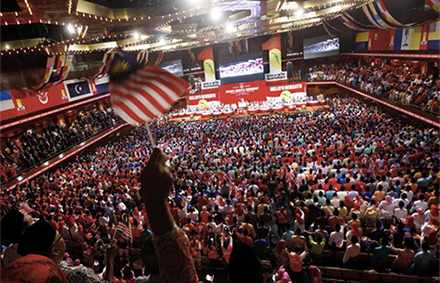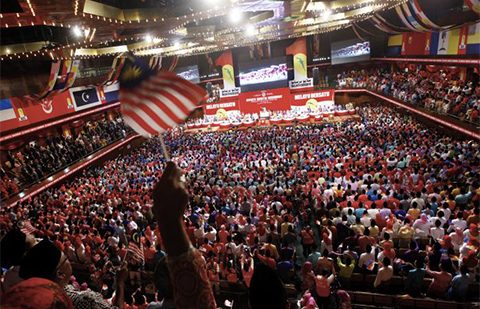
In another display of sycophancy and entrenched avarice, Malaysia’s long-time ruling party tightens its grip over the nation.
In spite of the presence of the prickly former prime minister Dr Mahathir Mohamad and recently sacked deputy prime minister Muhyiddin Yassin, last week’s biggest show in Kuala Lumpur proved a total fizzler.
Both men, seriously aggrieved, were royally ordered gagged from speaking at the annual UMNO convention by Najib Razak, the party’s president and scandal-plagued premier of Malaysia. Compared to the Malay party’s previous summits, this year’s was so tame it very nearly sent the audience into a coma.
The meeting limped from irrelevance to more irrelevance. It struggled to make any kind of sense. Understandably so, too.
UMNO’s credibility and legitimacy continues to wade in the depths of the muck-wracked Klang River. Never mind Najib’s display of ‘coolness’, humility, magnanimity, and all of his false bravado. ‘Bad news’ — one of the many stamps of his ‘government’ — was never too far away.
On the eve of winding up the marathon five-day soap-opera and associated windbagging, the heavily commodity-linked local currency, the ringgit, slipped past the US$4.33 mark. It barely moved on the final day. Foreign currency market predictions point the ringgit to an agonising US $4.50-$4.70 value range in 2016. So much for confidence in Najib who, curiously, is (still) Malaysia’s finance minister.
Amid the pitiable charade, though, were some light moments that were almost comedic. Thankfully.
One came courtesy of Khairy Jamaluddin, UMNO Youth leader and youth and sports minister. Khairy is always in his element when given the soapbox. And he certainly did not disappoint his legion of fans. He had one issue he simply had to get off his chest, and he did it in style.
In one breath he condemned those in UMNO who were working on ripping apart the Malay hegemonic party and its historical centrality and legacy in Malaysia’s political, social, economic and religious life.
Such censures are ‘standard issue’ anywhere in the world, even among Western democratic states. In the very next breath, like a woman scorned, Khairy beseeched Muhyiddin — who may yet face expulsion from UMNO — not to “divorce” Najib. Why break up the family, he pleaded.
This display of grandiosity, and effort to be seen as UMNO’s crisis mediator and martyr, was stunningly fatuous, utterly shameful, and thoroughly opportunistic. It was also most unsurprising and uninspiring. Khairy reads the political wind the way free-market economists read tea-leaves for their often off-the-chart forecasts.
His communion merely re-affirmed UMNO’s ideographic rituals in the spirit of its unreconstructed Malay feudalism. It also averred the infantile sycophancy that generally underscores Malaysia’s racially-mired political parties. This is where, and when, all semblance of intelligence inevitably goes AWOL. To be sure, the growing Malay divorce rate would have eased Khairy’s senseless fear of separation as anything but normal.
What was Khairy Jamaluddin’s game with his supplication toward Muhyiddin Yassin? It was his rendition to UMNO diehards of his entirely populist Malay-ism, his Melayu-ness credentials, all in the hope of cementing his position in the party’s hierarchy at a time when UMNO’s internal politics are so fluid that they threaten to tear out its innards. Besides, Najib is so volatile he could well sacrifice Khairy for an unbending, unquestioning loyalist.
Targeting Muhyiddin to make his peace with Najib typically illustrates Khairy’s political cunning. He has sided with his boss who, for now at least, appears to hold all the aces and is playing them close to his chest. This makes Najib’s underlings incredibly nervous. Khairy has always shown he crooks to the political breeze as easily as a gymnast. So far as he is concerned, he is laying down tracks for a possible tilt at becoming PM sometime in the future.
Kowtowing to one’s political masters is one element of track-laying, and a very necessary part of it, regardless of UMNO having become decidedly rudderless, leaderless, and more menacing. Kowtowing is not unusual when UMNO actively promotes, if not demands, sycophancy of its rank and file, especially of its cadre class, the way the Chinese Communist Party always has of its own.
It is no more unusual than the rather silly debates in Malaysia over whether UMNO will remain the most dominant political party in the country, having further relegated its racially-exclusive coalition partners in Barisan Nasional to a status worse than ‘minnow’ while the political opposition is hopelessly in disarray, nearing a second and permanent fracture.
There is also no disputing the fact that anybody, much less Khairy, is about to ease back the lever of UMNO’s historical hegemonic project. The party has far too much to lose. Winning power and control of the ‘central government’ is not, nor was it ever, since 1969, the main game of ‘governing’ for all ‘Malaysians’, let alone the Malays, other than in name.
Khairy understands all this very well. In the parlance of the historical-political sociologist Charles Tilly, state-making and state capacity come not solely and strictly from electoral power, although it helps. In Malaysia federal elections are perennially rigged and voters routinely defrauded, with the Malaysian Election Commission, a branch of the UMNO bureaucracy, lending a hand.
State-making and state capacity emerge from entirely different sources, namely Malay feudalism, and the vast system that powerfully engenders and promotes a corrupt network of patron-client relationships and class re-alignments. Half of these networks remain necessarily in their agri-traditional form; the other half has ‘modernised’ alongside the development of Malaysian capitalism.
Think of Malaysia’s patronage system as UMNO’s personal central bank — one that has expanded exponentially since the early 1980s under Mahathir who promoted and nurtured national avarice as Malaysia’s national sport or religion among its ruling political class and business cronies by an equal click.
This is the very system Khairy will continue to defend and promote to ensure his place closer to the apex of political power or structures of power that would launch him into making a play for the UMNO’s central leadership. Khairy ingratiating himself to Najib is clear and understandable.
What is most unclear is his self-proclaimed reformist zeal. That record does not augur well, however.
Manjit Bhatia is head of research at AsiaRisk, an economic and political risk consultancy firm.
 Facebook
Facebook  Twitter
Twitter  Soundcloud
Soundcloud  Youtube
Youtube  Rss
Rss 